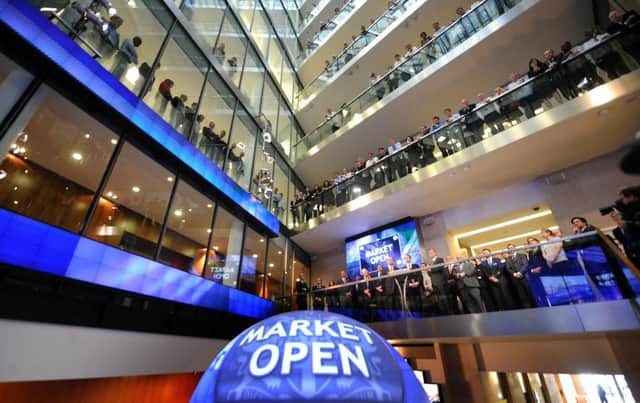Markets appear to have brushed off '˜Leave' vote


But it isn’t on the pros and cons of an exit nor whether it is the right thing for the UK.
We won’t know the answer to that for many years to come not least because we don’t know what our trading relationship with the rest of the world will look like in two years’ time.
Advertisement
Hide AdAdvertisement
Hide AdIt concerns the ease with which stock markets have seemingly taken the Leave vote in their stride.
It is nothing short of incredible that all the main UK equity indices are higher now than they were on June 23.
One credible explanation – for the FTSE 100 at least – is that the UK has a large component of listed companies with overseas earnings.
Simplistically, the devaluation of sterling against the euro and US dollar has at a stroke increased earnings denominated in those currencies by around 10 per cent over the past six weeks or so.
Advertisement
Hide AdAdvertisement
Hide AdUS markets are also in bullish mood with the Dow, S&P and NASDAQ all hitting record highs last week.
Companies that have dual listings in the US have risen to regain parity with the pricing of their securities in the overseas market and this has also been a positive pull on share prices.
Resources stocks have been particular beneficiaries of this. Perhaps no coincidence then that the FTSE 100 Index has risen by around 10 per cent.
But currency movements don’t explain why the smaller company indices – the FTSE SmallCap and AIM, for example – have also been remarkably strong and now stand 6 per cent to 7 per cent higher than before the vote.
Advertisement
Hide AdAdvertisement
Hide AdThese indices have a much higher proportion of indigenous companies with largely UK-based earnings so currency movements are not an issue.
The implication is that these companies have seen a positive re-rating of their shares, odd given how uncertainty has increased yet markets hate uncertainty.
Although we are less than two months on from the Leave vote, by and large those companies putting out trading updates suggest it’s ‘business as usual’.
Consumers are still spending. The lights haven’t gone out.
It is of course much too early to judge Brexit on a few months’ survey evidence and there are two key reasons for caution.
Advertisement
Hide AdAdvertisement
Hide AdA common, though not universal, theme I come across speaking to CEOs and FDs of smaller quoted companies is a greater degree of caution.
Why commit to a large capex programme or hiring spree now when the environment may be very different in six or twelve months’ time?
If enough business managers are thinking like this then there will be the inevitable disappointment of profit “slippage”.
Investors should be on their guard in autumn for the usual slew of trading updates when it becomes clear whether or not those companies with December year ends will hit their num- bers.
Advertisement
Hide AdAdvertisement
Hide AdForecast risk has definitely increased. The second banana skin is inflation.
Already there is talk of how the European car manufacturers, for example, will react to the sudden 10 per cent devaluation of sterling against the euro.
Higher prices, be it for staples such as food and clothing or for high ticket discretionary spend items seem an inevitability thus reducing the all-important consumer’s spending power.
Markets have been skittish in their response to Brexit.
Whatever the long-term outcome and prognosis for UK plc, there are some serious short-term headwinds to navigate before the end of the year.
That should make investors nervous despite the equity markets suggesting the opposite.